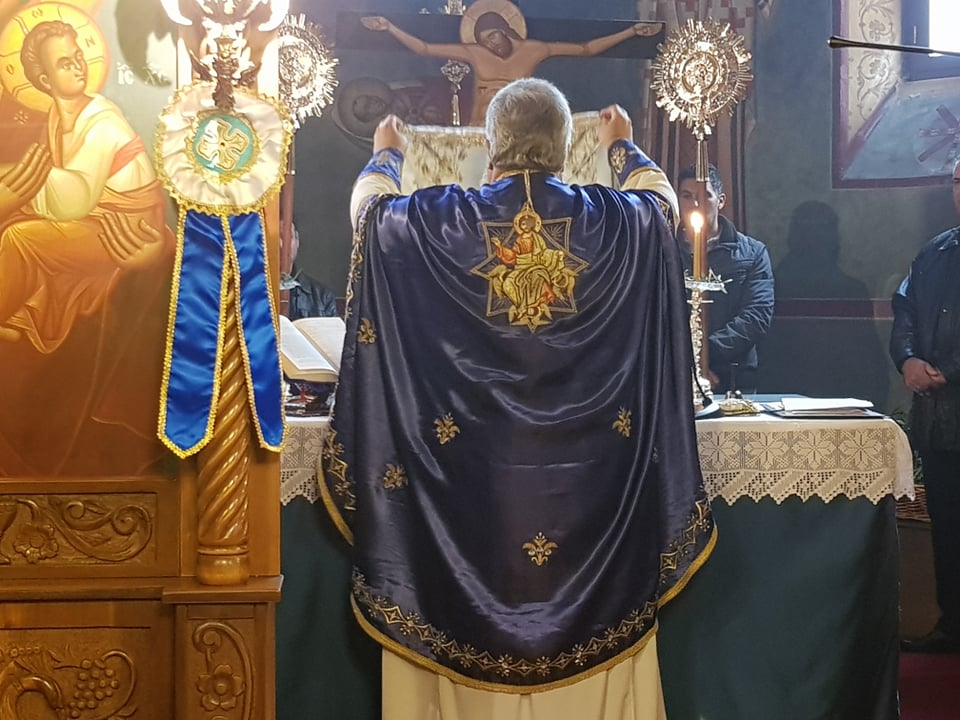
In today's 40th Sermon we will deal with the final Prayer recited by the Celebrant, the final blessing of the people and the Dismissal.
After the Prayer behind the Ambon the people chanted: "Blessed be the name of the Lord, from this time forth and to the ages". This final praise of the name of God is taken from the Psalm 113:2 [112 LXX]. This Psalm is the first in a series of Psalms (113-118) sung by the Jews on Passover. Thus, it is almost certain that this verse was sung by the Lord and His Disciples at the end of the Last Supper. The Evangelist Matthew writes: "And when they had sung an hymn, they went out into the mount of Olives" (26:30).
The faithful, the present-day disciples of Christ, before leaving the church, glorify together with Christ the Holy Name of their heavenly Father for all the wonderful things he has done. And it is the best time to utter with our mouths the holy Name of God, because now our mouths have been sanctified by the communion of the one and only Holy One: Christ.
The Celebrant goes to the Table of Oblation and recites in front of the Holy Gifts a prayer: "Christ our God… Fill our hearts with joy and gladness always...". It is impressive that the last prayer of the Divine Liturgy which is recited before the Holy Gifts refers to joy and gladness. Yet we do not ask only for joy, but for Christ to fill our hearts with joy and gladness. We ask Him to fill us with joy, that is not like the one the world seeks, but with His own pure, true and lasting joy, which He promised to send to His Disciples: "No one can take away your joy" (John 16:22). The natural state of the Christian is to be happy. Even when facing adverse situations. The apostle Paul tells us: "[I] who now rejoice in my sufferings" (Col. 1:24). Thus the faithful, with happy and peaceful hearts, are preparing to leave the temple.
The Celebrant blesses the people for the last time with the Blessing of the Lord: "May the blessing of the Lord and His mercy come upon you by His divine grace and love for mankind…". That is, he prays to God to have mercy on us and save us because we have nothing of our own to present worthily for our salvation, but we look forward only to the grace of the Lord, who is our only Savior. That is why the Celebrant recites during the Dismissal the following: "Christ our true God, by the prayers of..." and he invokes the Saints to intercede for us and above all the Blessed Mother of God, through whom mercy came to us.
After the Dismissal, the Celebrant distributes the Antidor. As the word itself reveals, Antidor is offered instead of the Holy Gifts (Anti/instead of, dor/gift) to those who did not partake of the most precious Gifts, the Holy Body and Blood of the Lord. The bread that is distributed as Antidor comes from the offerings that have been offered to God, and from which we took out the Amnos (Lamb) and the portions of the Saints. The Antidor has also been sanctified because it was offered to God. That is why the faithful receive Antidor from the hand of the Priest (who just a moment earlier touched the holy Body of the Savior Christ). The faithful embrace the hand of the Priest with reverence and take care so that not the slightest crumb falls down from the Antidor.
In many churches, after the Dismissal, the Reader reads the prayers of thanksgiving from the Service of the Holy Communion. This is useful for those who do not have access to this text in order to read the prayers in the quiet of their homes. During the reading of these prayers there must be silence in the church. Sometimes it happens that the sacred atmosphere that prevailed until that moment suddenly changes. Believers, who see their loved ones again, begin to converse with each other and a noise is formed, which alters the sacred atmosphere of the church. Of course it is understandable that when we step out of the church it is natural to seek to meet with our brothers.
We should all realize that as long as we are in the church, we are in the House of the Lord, standing before God. "How awesome is this place! This is none other than the house of God…" Jacob exclaimed about the place where he met with God (Gen. 28:17). We ought to show even more reverence and respect in the Christian church.
My dear brothers and sisters, ending today the series of these 40 Sermons, with which we tried to understand more deeply the Divine Liturgy, guided by the Fathers of the Church and thoughtful scholars, who were engaged in the interpretation of the Divine Liturgy, I have one concern: Did our listeners correctly understand the interpretations we have chosen from the fathers, or did they consider them to be exaggerations and reject them without rethinking? The purpose of our Sermons and these interpretive comments is to focus our thoughts and our hearts every time we participate in the Divine Liturgy, in order to understand more and more deeply what is achieved during the Divine Liturgy, so that our worship happens not only by habit, but "in spirit and truth".
It is natural that some spiritual truths cannot be equally understood by all. It depends on the power of faith, the purity of the heart and the grace of God, which opens the spiritual eyes, to see spiritual realities, which others might not even grasp. Let us therefore accept, with confidence, the teaching of our God-enlightened Fathers also in the matters of the Divine Liturgy, and let us strive more and more to understand their spiritual experience. Amen.





